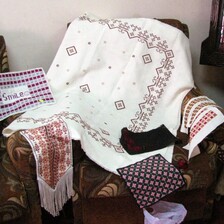Rafah, Gaza Strip 14 October 2007

Forty-five-year-old widow Sara Zo’rob holds chickens she received from the Save Gaza gardening project at the training hall in the Rural Women Development Society, Kerbet al-Adas village, southern Gaza Strip, October 2007. (Iyad Albaba)
“We have just initiated our small project with an intent to help these simple rural women sustain amidst their families’ harsh economic conditions,” says Yassmin Moor, a young Palestinian-American woman who manages a domestic gardening project in the Gaza Strip city of Rafah.
The project, which has been a part of the US-based Save Gaza program, is intended to empower poor women in the rural and remote areas of the Gaza Strip.
In the furthest eastern location of Rafah city, an area called Kherbet al-Adas, a local public service facility for rural development has been designated for the training of 20 Palestinian women representing 20 different families.
Chickens and small plants are some of the items provided by Save Gaza for the participants with the hope that the women can create their own domestic gardens and become independent of “Israeli-controlled products and goods.”
“Now … hopefully with these gardens the women can have some of their own vegetables, but also can trade with their neighbors, so we are also building community relations and mobilizing them to move towards sovereignty and sustainability and not have to rely on Israel for anything,” says Yassmin.
Participants have found the project beneficial as most come from poor families or live alone as widows or divorcees.
Sara Zo’rob, a 45-year-old widow and mother of three children, told EI that this new enterprise, however new to them, will help her ensure some basic needs as she has always relied on aid from the local authorities or the United Nations agency for Palestinian refugees, UNRWA.
“This [project] is really great and thanks go to the development society and Save Gaza, as they are offering us a unique chance that would help us be independent,” says Sara.
The project ensures that local Palestinian women, who have uniquely suffered the hardships of the four-decades-long Israeli occupation in Gaza, are being active by taking part in the training.
Ahlam al-Shaer, chairwoman of the Rural Women Development Society, believes that the Save Gaza project is a space for the local women to learn new things, especially amidst shortage of training and assistance programs since Israel put in place an economic embargo on the coastal region after the Hamas government was elected in January 2006.
Currently, 81 percent of Gazans are living below the poverty line and more than half of the population rely on foreign aid for such basic needs as flour, rice, and sugar.
Most in Gaza come from farming backgrounds and the desire to care for the land is something they still carry with them from when their families tended land in historic Palestine. After the dispossessed of historic Palestine with the creation of the state of Israel, the Gaza labor force became subservient to the Israeli economy. Save Gaza aims to bring Palestinians back to their roots and allow these women to rise above Israel’s economic occupation.
Rami Almeghari is currently contributor to several media outlets including the Palestine Chronicle, aljazeerah.info, IMEMC, The Electronic Intifada and Free Speech Radio News. Rami is also a former senior English translator at and editor in chief of the international press center of the Gaza-based Palestinian Information Service. He can be contacted at rami_almeghari at hotmail.com.
Related Links





